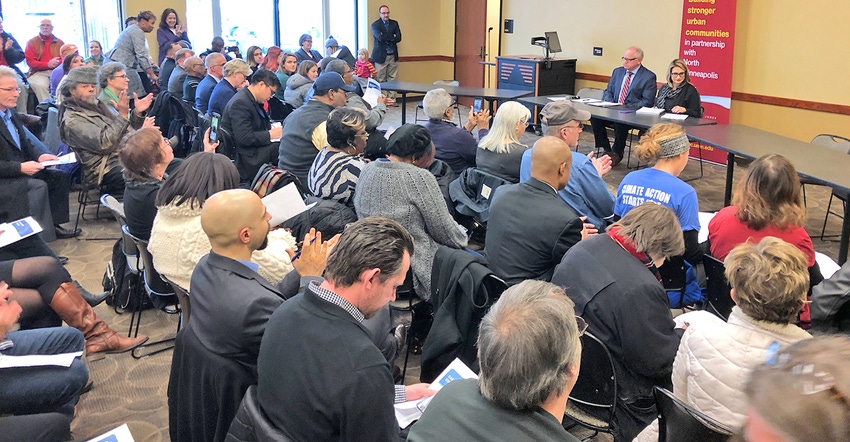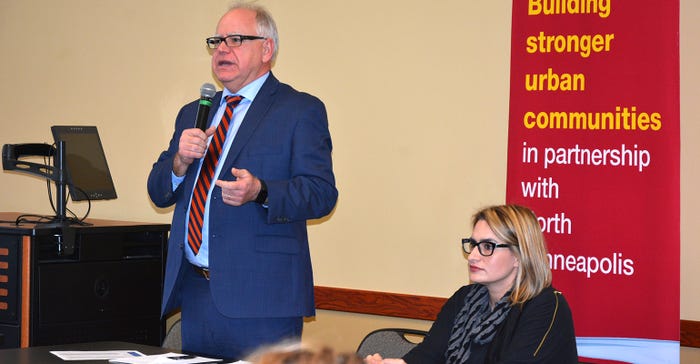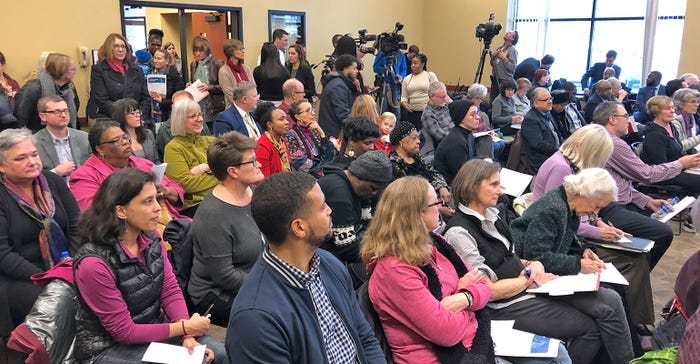December 6, 2018

I’ve not attended a gubernatorial listening session held a month after an election, have you?
In what has been called an unprecedented effort, Minnesota Gov.-elect Tim Walz and Lt. Gov. Peggy Flanagan hit the road for a five-day tour during some potentially inclement weather to visit nearly two dozen communities.
Their goal? To follow through on their “One Minnesota” campaign message, gather ideas and perspectives from those in attendance, and to encourage new leaders to step forward and work with their administration.
“One Minnesota is more than a campaign slogan, it’s a way of governing,” said Walz in a news release. “From Luverne to La Crescent to Hallock to Grand Portage, we will travel to all four corners of the state to seek input from Minnesotans on what they hope for from our administration. When the outcomes of an election turn out differently than someone wished, they tend to feel like their voice won’t matter. That won’t be the case in our administration. Everybody’s voice matters to us.”

ON THE ROAD: Gov.-elect Tim Walz and Lt. Gov-elect Peggy Flanagan asked for potential leaders to step forward and apply for appointed positions in state government. Applications are due Dec. 7.

The two made the effort to visit areas where they did not receive strong support. They also invited state legislators from both political parties to attend the listening sessions.
Stops on the listening tour took place Nov. 29 through Monday at Mankato, Luverne, La Crescent, Marshall, Granite Falls, Rochester, Minneapolis, Fergus Falls, St. Paul, Moorhead, Crookston, Hallock, Prairie island, Winona, Red Lake, Bemidji, Hibbing, St. Cloud, Foley, Silver Bay, Grand Portage and Duluth.
Intrigued, I attended the Nov. 30 session held in north Minneapolis at the University of Minnesota Urban Research and Outreach Engagement Center. It was standing room only by the time I arrived, with about 200 people at the event.
Brief introductions and opening comments were offered. Walz made it clear that this administration is not theirs — it’s Minnesota’s administration.
“Our goal is to continue to be inclusive,” he said, adding it was important to our democracy that open meetings be held in front of a free press.
Staffers carried microphones around the room to folks with raised hands. Other staff members took notes of comments made. The location of the listening session reflected some of the concerns of the north Minneapolis community:
• ethnic diversity in state agencies and state leadership positions
• economic development along the Mississippi River through the Upper Harbor Terminal Development Project
• paid family medical leave and continuing support for paid medical assistance programs
• urban farming and past efforts of the Sweetie Pie Project
• special education in schools not funded at mandated levels; inflation not figured into budgets
• employment challenges for legal immigrants
• recognition of and assistance to help incarcerated individuals re-enter the community
• training for teachers to help gay and transgender students

PACKED HOUSE: Around 200 people attended the north Minneapolis listening session hosted by Walz and Flanagan.

As I listened, I wished folks from outstate Minnesota could have been there, because this is where it all starts — listening to each other, in person and in the moment. I heard comments to which I could relate. And I heard comments regarding issues that I had not considered before.
It made me think of efforts several years ago by a small group of interested farmers and environmentalists to learn from each other. They met in person and took turns visiting farms, watersheds, rivers and streams. They developed a better understanding of farming practices, conservation in place and human impact on water quality.
What if we could do that with urban and rural community leaders? Get north Minneapolis leaders on farms. Have farmers spend a day with teachers in Jenny Lind Elementary, where 90% of the students receive a free or reduced-price lunch, and only 5% of the student population is white.
We hear about the Minnesota urban-rural disconnect, and I wonder with the state leadership we have now, if that will start to dissipate.
Both Walz and Flanagan encouraged people to consider working for state agencies in some capacity.
“Everything impacts all of us,” Walz said. “I will ask you, what can you do for Minnesota? Our responsibility is to place people who can do [the job]. We aren’t going to succeed alone, and we welcome you in.”
Flanagan added that they are accepting candidates for appointed leadership positions within the executive branch. Applications are due Friday via the mn.gov/tim-walz/careers website. The goal is to have all commissioner appointments ready by Jan. 7.
As the two-hour meeting concluded, Walz thanked folks for attending and encouraged ongoing involvement.
“Continue to engage with us and hold us accountable,” he said. “I implore you. We can rise above what is going on at the national level. This room gives me the hope that we can get it done.”
I felt it, too.
You May Also Like




